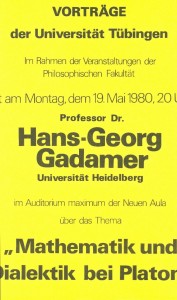 Catholic Hermeneutics: The Theology of Tradition and the Philosophy of Hans-Georg Gadamer
Catholic Hermeneutics: The Theology of Tradition and the Philosophy of Hans-Georg Gadamer
A dissertation by Mark F. Fischer presented to the Faculty of the Graduate Theological Union in Partial Fulfillment of the Requirements for the Degree of Doctor of Philosophy. Berkeley, CA, December 12, 1983.
To view the dissertation as a series of PDFs, click here.
Part One: Hans-Georg Gadamer and the Decline of Tradition
In this part of my dissertation, I reflected on a basic truth, namely, that people are never completely aware of the forces that have shaped them. People take for granted much of the life into which they are born. For most, language and customs are simply what destiny has given, and they accept them – if they think of them at all – as a part of life. And even when students of the humanities dedicate themselves to the cultivation of their cultural heritage, only a portion of that heritage comes to conscious reflection. No one can be fully conscious of the whole, for it is the very weave of the fabric of life. We call the whole our tradition, and it constitutes our historical existence.
With the onset of the 18th century’s philosophical Enlightenment, however, the claim of tradition to be a constitutive part of true knowledge fell into question. Skeptics had always, rightly or wrongly, criticized particular traditions. But in the time of the Enlightenment, thinkers began to imagine a life free from tradition overall, that, is, free from the unexamined prejudices of the past. They pursued an illusory freedom – illusory, because no can ever be wholly free of the effect of tradition. This quest for freedom led to the decline of tradition. Tradition declined insofar as philosophers viewed it as a source of error, rather than as the boundless richness of historical existence.
That tradition declined is a broad thesis. How can we substantiate it? Gadamer showed a way by focusing on two movements or tendencies in the intellectual life of 18th and 19th century Germany. He called the first movement aesthetic consciousness. This was the movement, attributed to Immanuel Kant, which regarded judgments about human customs and mores as existing apart from true knowledge. True knowledge was (for Kant) the realm of empirical evidence. Judgments about customs and mores, by contrast, were not empirical. To be sure, the cultural heritage constituted a broad field for aesthetic appreciation, that is, for contemplation and reflection. When we make judgments about that heritage, said Kant, we impose order on experience, but do not gain new knowledge. For that reason, Kant said that judgments regarding the past are not a source of truth. Gadamer rejected this opinion.
The second movement upon which Gadamer focused was romantic hermeneutics. The romantic age in general, and Friedrich Schleiermacher in particular, did not regard the past monuments of tradition as binding upon or normative for human culture. Cultural monuments – the Bible, for example, in Christian culture – reflected the erroneous thinking of their day, and thinkers of the Romantic age wanted to emancipate themselves from such errors. Instead, they regarded themselves as the judges of those monuments. Such thinkers believed that their duty was to expose the shortcomings of the cultural heritage. They believed themselves able to understand it better than those who created it in the first place. Gadamer argued that this assumption runs contrary to the spirit of the humanities.
Aesthetic consciousness and romantic hermeneutics diminished the appreciation of the positive role played by tradition. The adherents of those movements failed to appreciate the claim of tradition upon the human family. They did not view themselves as the cultivators of tradition, turning over the soil of the past so that it might continue to bear fruit. No, they fenced off the realms of customs and mores from the fields of knowledge, or set themselves apart as critics of past harvests. In this way, tradition declined. The first part of the dissertation traced the decline, restating the analysis of Gadamer. The 18th and 19th century no longer regarded tradition as a common heritage or patrimony, but rather as a source of persistent error.
To read about the second part of the dissertion, click here.

